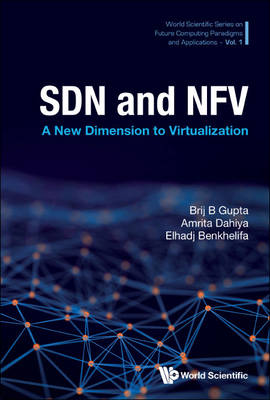
- Retrait gratuit dans votre magasin Club
- 7.000.000 titres dans notre catalogue
- Payer en toute sécurité
- Toujours un magasin près de chez vous
- Retrait gratuit dans votre magasin Club
- 7.000.0000 titres dans notre catalogue
- Payer en toute sécurité
- Toujours un magasin près de chez vous
Sdn and Nfv: A New Dimension to Virtualization
Brij B Gupta, Amrita Dahiya, Elhadj Benkhelifa
Livre relié | Anglais
149,95 €
+ 299 points
Description
Software-defined network (SDN) and network function virtualization (NFV) are two technology trends that have revolutionized network management, particularly in highly distributed networks that are used in public, private, or hybrid cloud services. SDN and NFV technologies, when combined, simplify the deployment of network resources, lower capital and operating expenses, and offer greater network flexibility. The increasing usage of NFV is one of the primary factors that make SDN adoption attractive. The integration of these two technologies; SDN and NFV, offer a complementary service, with NFV delivering many of the real services controlled in an SDN. While SDN is focused on the control plane, NFV optimizes the actual network services that manage the data flows. Devices such as routers, firewalls, and VPN terminators are replaced with virtual devices that run on commodity hardware in NFV physical networking. This resembles the 'as-a-service' typical model of cloud services in many aspects. These virtual devices can be accessed on-demand by communication, network, or data center providers.This book illustrates the fundamentals and evolution of SDN and NFV and highlights how these two technologies can be integrated to solve traditional networking problems. In addition, it will focus on the utilization of SDN and NFV to enhance network security, which will open ways to integrate them with current technologies such as IoT, edge computing and blockchain, SDN-based network programmability, and current network orchestration technologies. The basics of SDN and NFV and associated issues, challenges, technological advancements along with advantages and risks of shifting networking paradigm towards SDN are also discussed. Detailed exercises within the book and corresponding solutions are available online as accompanying supplementary material.
Spécifications
Parties prenantes
- Auteur(s) :
- Editeur:
Contenu
- Nombre de pages :
- 292
- Langue:
- Anglais
Caractéristiques
- EAN:
- 9789811254871
- Date de parution :
- 16-02-24
- Format:
- Livre relié
- Format numérique:
- Genaaid
- Dimensions :
- 152 mm x 229 mm
- Poids :
- 557 g

Les avis
Nous publions uniquement les avis qui respectent les conditions requises. Consultez nos conditions pour les avis.






